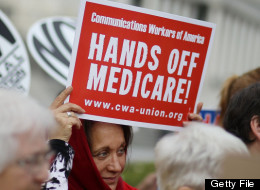2012 Medicare Debate: Baby Boomers At Center Of Issue
Sunday, January 1, 2012
The main problem is that "profit" isn't the right measure to use in this context. Profit is a deceptive measure when used with insurance, because the amount of money that flows through insurance companies is vastly disproportionate to the work they do or the value they add, just by the nature of the business.
To put it more simply: private insurance companies' "costs" are probably about half of all the healthcare spending in America, since that's the proportion they cover. And their revenues are somewhat higher than that (currently about 4.3% higher, according to Yahoo business).
But it's not as if they're actually doing half the work in America's healthcare system; they're just collecting premiums and paying bills, plus a lot of administration and advertisin g. If I had a business that consisted of people giving me $100 bills and me paying them back $96, it would be silly to describe that as a very low-profit industry.
A better measurement is not profit, but might be return on invested capital (ROIC).
ROIC measures how much money it takes to set up and run an insurance company, versus how much profit it brings in. Unfortunately it's not so easy to find good ROIC figures. The closest equivalent Yahoo business has is return on equity (ROE), but that can vary according to whether firms are financed through equity or debt.
Still, across the entire industry this hopefully evens out a bit, and what it shows is that ROE in health insurance is about 16.1%, roughly the same as for the healthcare industry as a whole, and a good deal higher than the average ROE in most sectors of the economy.
Read the Article at HuffingtonPost Read more...









